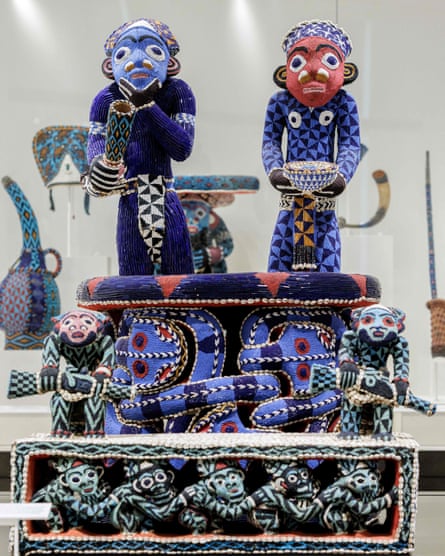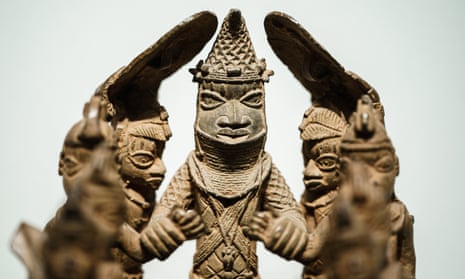Visitors to room 210 at the Humboldt Forum, the new €644m Berlin museum that completed its staggered opening last Friday, may briefly find themselves reminded of the British Museum.
In both, a distinctive wall of metal rods marks the start of a display about the former Kingdom of Benin. In London the metal grid is adorned with cast bronze reliefs depicting Benin kings and warriors, which remain in the museum’s possession despite being looted by British soldiers over a century ago. In Berlin, by contrast, the rods support a row of plasma screens, on which German and Nigerian curators, officials and activists explain why the bronzes don’t belong in Europe any more.
The video installation, initially planned as a footnote for the exhibition’s back end, was moved to the front at short notice to reflect recent developments: in July Germany and Nigeria signed an agreement to restitute all the Benin bronzes in Berlin’s possession. Those 40 bronzes on display, whittled down from around 200 and now paired with works by contemporary Nigerian artists, are only on loan for a 10-year period.
The curatorial nod to the British Museum also serves as a reminder of the kind of place the Humboldt Forum was envisioned as 30 years ago. It was in the early 90s that a group of rich German industrialists first put together plans to tear down the modernist cuboid that housed the GDR’s parliament and rebuild what stood on the site before: the 15th-century baroque palace that was once home to the Hohenzollern dynasty of imperial Prussia.

The idea was that Berlin, still looking dishevelled after serving for 40 years as the cold war’s pressure cooker, could be polished to match the grandeur of the other big European capitals. Filling the flamboyant shell of the Berliner Schloss with objects held from Berlin’s ethnological collections was an afterthought but one that matched its ambition, especially when backers managed to recruit the British Museum’s Neil MacGregor as its founding director in 2015.
While the foundations for this new hub for “world culture” were being laid, however, the world moved on.
A growing debate about whether European museums should return African heritage to the continent, driven by French president Emanuel Macron, was crystallised in Berlin when restitution specialist and art historian Bénédicte Savoy resigned from the Humboldt Forum’s advisory board in July 2017, frustrated with the institution’s unwillingness to investigate the bloody colonial backstories of its collection.
The museum’s potential audience was changing, too: in the 20 years since the Humboldt Forum was greenlit by the German government, the number of international visitors to the capital has increased fivefold, making up almost half of the annual tourists who washed into the city before the start of the pandemic.
With the opening date moving closer, the idea of a British Museum-style tourist attraction in Berlin – high-mindedly explaining the world with objects hoarded under a Prussian dynasty responsible for some of the most gruesome colonial raids and genocides of the 20th century – seemed tone-deaf and hopelessly behind the times.
Likening the Humboldt Forum’s toxic heritage to Chernobyl, Savoy suggested filling the exhibition halls with replicas instead. “A fake museum inside a fake palace, that would make sense,” she told Süddeutsche Zeitung.
This summer’s deal over the Benin bronzes has spared the directors some blushes. Coming 50 years after Nigeria first requested to be given the objects on a permanent loan, and driven on by pressure that was mainly created by France and restitution activists in Berlin, the Humboldt Forum’s pioneering role in this regard must not be overstated.
Nonetheless a genuine willingness to learn from past mistakes and rethink how ethnological collections are displayed is tangible in the newly opened eastern wing.
Some permanent and temporary exhibitions were curated in collaboration with indigenous communities from the countries where the objects were bought or seized. Collections from South America are displayed in the style of ëttë roundhouses of the Ye’kuana tribe of Venezuela and Brazil, and an exhibition on the Omaha tribe of Nebraska is laid out “like a circle of stories” and flanked with contemporary video interviews. A section on different aspects of Islam contains not only a magnificently colourful patchwork dervish robe from Iran but also a rainbow flag hoisted at Berlin’s Ibn Rushd-Goethe mosque this summer.

The curatorial approach is far from consistent. Some sections of the newly opened exhibition halls feel traditional, while others more directly address the issue of colonial exploitation: a temporary display on Tanzania, a former German colony, openly chooses not include any of the 10,000 Tanzanian objects in the stores of Berlin’s Ethnological Museum since their provenance was found to be too problematic. Vitrines are instead left empty or contain “surrogate objects” made by contemporary artists.
“Like a recalcitrant student told off by his parents, the Humboldt Forum is beginning to do its homework and ask key questions”, Savoy told me on the eve of the museum’s opening. “Yet its architecture also matters and can be regarded as a form of historical denial. But how to combine historical truth and historical denial?”
“One of the big issues for European museums is whether they will dare to tell us inconvenient truths that may lead us to call into doubt whether these institutions should exist in the first place. Can museums really tell an honest and sometimes ugly story and continue to do business as usual?”
The palatial surroundings, with their pristine white walls and natural stone staircases, remain the main reason why the Humboldt Forum feels like an inquiry into what a modern museum of world cultures could look like, but not an answer.
Panels of text next to the objects go to some lengths to tell the story of how the Benin bronzes were looted by British soldiers and sailors on a punitive expedition to Benin City in 1897 and later sold in Europe and North America. The words “acquisitions” and “collections” are only used in inverted commas. But the violence involved is only hinted at – directly conveying the ruthless bloodshed amid the awe-commanding halls is a risk the curators were not willing to take.

A look across the road could have shown it needn’t be so. A 2016 colonialism exhibition at the German Historical Museum on the other side of the Unter den Linden boulevard included German tin soldiers massacring Herero tribesmen and vandalised statues of Prussian generals, showing even established museums can manage to shock their visitors into reflection.
In the end, even the hastily reshuffled videos at the start of the show feel less like the gesture of humility, and more like a pat on the back (and a fairly pompous one at that, with museum’s directors now taking the opening exhibition spot previously marked for Benin kings and warriors).
“We talk, you listen” may be the title of one of the exhibitions, writ in large black letters above the display of Omaha objects and heralding an inversion of colonial perspectives, but as a motto it is one the Humboldt Forum will likely take some time to internalise.
